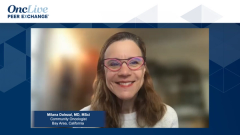
Future Directions in the Management of HER2+ Breast Cancer
Before closing out the discussion on the management of HER2+ breast cancer, experts share their excitement on future treatment strategies.
Transcript:
Shanu Modi, MD: These were great cases I just want to say. And maybe I can ask a broader sort of closing question, not so much about a case but to all of you 3 panelist. What do you see? We have witnessed an explosion in active therapies for HER2+ breast cancer in these last 2 years. A lot of exciting drugs have been approved with excellent efficacy, durable efficacy. With more drugs in the pipeline how are you seeing the landscape for HER2+ breast cancer changing potentially in the next even 1 to 2 years? Maybe I’ll start with you Sara.
Tiffany Traina, MD: It is exciting to see so many new options and it’s making our sequencing continue to rchange which is exciting. And it will continue to change over the next year or 2 as you allude to, it’s possible T-DXd [trastuzumab deruxtecan] can move up earlier if it moves into a first-line setting perhaps. And we’re going to see new novel ADCs come along. We have several new HER2 directed ADCs which look very promising. It’ll be interesting to learn how ADCs work sequentially one after the other. We don't have any data about most regimens post T-DXd at this time and will be again, a big learning less for us to know if they’re hitting the same target and have different pay loads how they work and if there are any cross resistant mechanisms. But this will all get turned on its heels if some of these agents move into the early stage setting as we see T-DXd being studied in residual disease and pre op and tucatinib being in the post pre op. It’s just going to be interesting to see how that fits in and hopefully we’ll just have so few patients recur that the sequencing issue in fact won't be such a challenge because people will just do so well I hope.
Shanu Modi, MD: That would be a blessing. Rena or Tiffany are there any trials in particular that you’re kind of looking forward in the HER space?
Tiffany Traina, MD: Sure, a few that we alluded to earlier in the conversation around a de-escalation strategy where we can use response to neoadjuvant therapy to be able to potentially deescalate the neoadjuvant setting and escalate where need be in the adjuvant setting for those who fail path CR [complete response]. Seeing some of the combination trials with IO and HER2+ breast cancer or CDK46 inhibitors in ER+ HER2+ breast cancer will be interesting also. Agree that I’d love to see these highly active agents moving up into earlier stage disease and including TKIs [tyrosine kinase inhibitors] where maybe we’ll see an impact in reducing the occurrence of CNS metastases. Those are sort of the highlights, short-term highlights for me.
Shanu Modi, MD: Agree completely. I would love to see something prevent CNS disease. Rena anything in particular that you’re excited about in the nearby future?
Rena Callahan, MD: In addition to IO and CDK inhibitors just some of these newer antibody drug conjugates that I've been kind of seeing in the clinic in trials have been just really mind blowing, ARX788 in the bispecific antibody, ZW25. I have a patient who had, based on the first scan 6 weeks later 75% reduction in tumor volume heavily pretreated. Pretty amazing. There’s this tendency, if we use everything all at once don't we have to save things for the future? And I don't think we have to because we have a lot that is coming in the future, we don't have to save anything to try to get people to do better and live longer and live better.
Shanu Modi, MD: That’s great. On that positive note I’m going to thank you all once again to our panelists for their insights and their cases. And to our viewing audience thank you so much for joining us. We hope you found this OncLive® session or series to be useful and valuable for the treatment of your patients with HER2+ metastatic breast cancer.
Transcript edited for clarity.








































